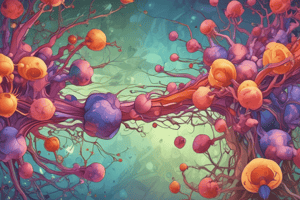Podcast
Questions and Answers
What are the cardinal signs of inflammation?
What are the cardinal signs of inflammation?
- Fever, fatigue, dizziness, and loss of appetite
- Redness, swelling, overheating, pain, and functional limitation (correct)
- Itching, rash, coughing, and sneezing
- Nausea, vomiting, diarrhea, and abdominal pain
What is the primary purpose of inflammation?
What is the primary purpose of inflammation?
- Suppress immune response and hinder tissue repair
- Increase permeability of blood vessels and induce fever
- Localize an infection, prevent the spread of microbial invaders, neutralize any toxins being produced at the site, aid in repair of damaged tissues (correct)
- Promote microbial invasion, spread toxins throughout the body, and cause tissue damage
How is pain in inflammation caused?
How is pain in inflammation caused?
- Direct nerve damage by microbial invaders
- Release of pain messengers (prostaglandin kinins and cytokines) by the immune cells (correct)
- Increased blood flow to the affected area
- Decreased metabolic activity in the affected area
What mediates the increase in temperature during inflammation?
What mediates the increase in temperature during inflammation?
What are the sequence of events in inflammation?
What are the sequence of events in inflammation?
Adaptive immunity develops before exposure to a suitable agent.
Adaptive immunity develops before exposure to a suitable agent.
The Adaptive Immune System is composed of highly specialized, systemic components & cells.
The Adaptive Immune System is composed of highly specialized, systemic components & cells.
T cell receptors (TCRs) recognize MHC markers as non-self and antigens as self.
T cell receptors (TCRs) recognize MHC markers as non-self and antigens as self.
The capacity of the adaptive immune system to remember an antigen is called immunologic memory.
The capacity of the adaptive immune system to remember an antigen is called immunologic memory.
If the same antigen appears again, B and T cells make a slower, weaker response.
If the same antigen appears again, B and T cells make a slower, weaker response.
Flashcards are hidden until you start studying



